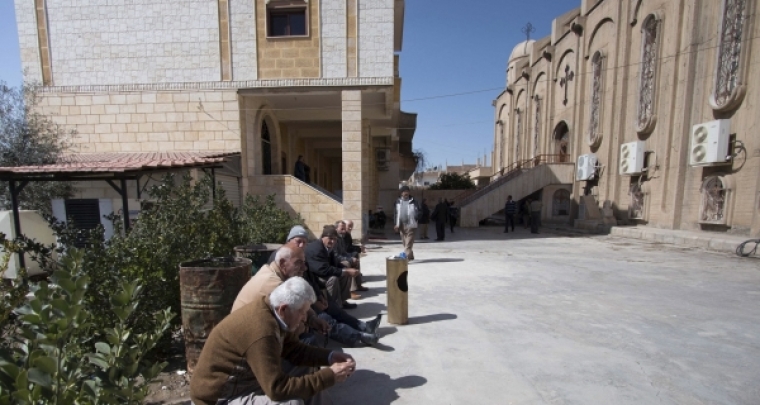

A Syrian Christian now living in the UK is helping to bring hope for the future to his native land as part of a worldwide advocacy campaign.
Rami (who can't use his real name for security) co-ordinates 'Hope for the Middle East', a seven-year advocacy campaign from charity Open Doors which works with the persecuted Church. It seeks to maintain a presence in the Middle East for the Church and to show that it has an active role to play in the future of Syria and the region as a whole.
He told World Watch Monitor, "I'm originally from Aleppo. About five years ago I moved to the UK to study. In the summer of 2012 I finished my Masters and planned to go back. At the same time, the protests against the Assad regime started to escalate. Flights were cancelled and borders were closed. I had my heart set on returning, but suddenly I couldn't go back. My family and friends still lived in Aleppo. I felt so disconnected. Whenever I read about something that had taken place, I asked myself: 'Where did this happen? How does this affect the people I know?'"
"Some have left [Aleppo], but many remain in the government-controlled Western part of the city. My parents too. They don't want me to worry and usually talk about general things. If I want to know specific things such as: 'Do you have enough food and water?' I need to ask them specific questions. I think that's only natural. We used to skype, but for the past few years we can only talk on the phone. Usually calling is not that difficult. But occasionally there are a few days or weeks in which I can't reach them. It's still dangerous. Recently a bomb almost hit my old church. More than half of my congregation has left Aleppo, possibly up to eighty percent."
Despite this mass exodus of people, the church is far from empty. "God has been very faithful. Newcomers fill the gap. Some are Christians from other churches, others are new believers with a Muslim background. The way the church functions has changed drastically of course. It's not secure to travel at night. That's why all evening services and activities have been cancelled or changed to earlier during the day."
Although fear is growing and the situation seems bleak, he believes there is reason to 'Hope for the Middle East'. "It's a bit of a challenge, really. I need to separate my personal emotions, opinions and feelings about things and try to be neutral. Sometimes working in advocacy seems hard when people are dying and striving for food. But this campaign is about achieving sustainable impact. That takes time. The upside is that it's great to bring people together and motivate thousands of people around the world. They show the willingness to support. Not only by advocating, but also by raising their voices in prayer. It's amazing to see how passionate people are and how they go the extra mile to make a difference.
"We see something in the Middle East that is probably unprecedented: the enormous exodus of Christians. At the same time the global Church recognizes how important it is that the Christians' presence is preserved in the Middle East. We are God's ambassadors. If the Christians leave the Middle East it's like God's presence is leaving the Middle East. The presence of the Church is vitally important. People are desperate and see very little hope. The fact that there still is a Church gives them encouragement and hope.
"Maintaining the presence of Christians is not only about them, it is for the good of society as a whole. In the reports and research we've conducted, we have mapped, in a way, all the contributions Christians have given to Iraq and Syria. It starts from the 1st century, when Christianity spread across what we now call the Middle East and we see that since then until now Christians have contributed to societies in literacy, in health, in translating and contributing to the Arabic language. Some of the best early centres of learning in the world were founded by Christians. Christians were among the first to introduce charitable works and NGOs. We see them involved in politics, and in the development of the Iraqi and Syrian states. Christians are among the most well-known businesspeople. And in the future Christians, alongside other numerical minorities, are vitally important for the stability of these countries. Policy makers and researchers agree that we need to maintain diversity in order to counter extremism and radicalization. We need diversity to ensure sustainable peace and lasting stability in the Middle East."
The way that Open Doors is tackling these issues, says Rami, involves working with indigenous church leaders in the Middle East, engaging with governments and decision makers across the globe, alongside the goal of collecting a million signatures in support of the campaign.
"Through extensive series of consultations with Christian leaders in Syria and Iraq we were able to identify three main problems that cause despair. Let me explain what these are and the recommendations we give to the UN and to governments.
a. Discrimination from government and other communities. We try to ensure a legal framework that guarantees equal citizenship for Christians and other numerical minorities.
b. Dignity in accommodation, work and education. Lots of refugees and internally displaced people received food parcels. Of course they are very grateful, but they would much rather provide for themselves.
c. Recognition for the role of the Church in rebuilding and reconciliation. As I said before: the Church belongs in the Middle East and needs to play a vital role in rebuilding."
"We call it the One Million Voices petition and we want to present it to the new UN Secretary General on 20 June 2017, World Refugee Day. The petition aims to underline the three points about discrimination, dignity and recognition. Open Doors is just one relatively small organization. Why would the UN listen to us? Our voice is soft among the thousands of other organizations which try to influence them. Our voice will only be heard if it's louder - that's why we need at least one million signatures. The second reason is that it encourages Christians in the Middle East. They also participate in the One Million Voices. Let's follow their example, come alongside them and show them they are not alone."
Courtesy of World Watch Monitor